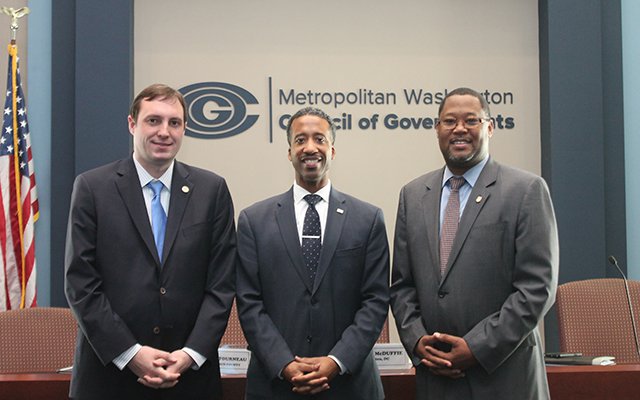
2017 COG Board Chairman Kenyan McDuffie, District of Columbia (center), with Vice Chairman Matthew Letourneau, Loudoun County, and Vice Chairman Derrick L. Davis, Prince George's County.
Kenyan McDuffie is the Chairman of the COG Board of Directors and the District of Columbia Councilmember representing Ward 5. He has been a COG member for five years. In this Q&A, McDuffie discusses his role as COG Board Chairman and the board’s work over the last year.
How did you get into public service?
I got into public service as an activist in my local neighborhood in the District of Columbia. I got elected civic association president, while I was in undergraduate school at Howard University because we wanted to fix things, such as get a pothole filled or an alley repaved in our neighborhood. I worked closely with the members of the civic association to rejuvenate a dormant association into an active group of residents who are still holding monthly meetings today as well as many of the events that we established nearly 20 years ago.
Why did you get involved with COG?
I joined the D.C. Council in 2012, and after about six months I expressed interest to the Council Chairman in getting involved with COG because I came to understand the importance of regionalism, specifically the cooperation between the various jurisdictions that make up COG. For example, I have three metro stations in my ward, so I know how vital our transportation system is to our region and how important it is to be able to collaborate on transportation issues to make sure that people can get around. I wanted to contribute my perspective from the District, but also learn from other members.
As a D.C. Councilmember, what does that experience bring to your work at COG?
I think my work at COG is so relevant to the work that is happening in the District of Columbia. The D.C. Council has thirteen members that make up our body and we represent the nation’s capital, but much of what we do is impacted by the surrounding jurisdictions. When we make decisions about our spending on issues such as Metro, then we are mindful of the impact it has on the residents who come from Northern Virginia, Prince George’s County, Montgomery County, and others as well. The interests of the District of Columbia’s residents are also shared interests in many cases, such as workforce development, public safety, and housing, to many of the constituents in COG’s member jurisdictions.
How does the District of Columbia benefit from membership with COG?
We benefit from membership with COG in many ways. We share ideas, we learn from each other, and we go on joint delegations, such as the trade mission to Toronto. We also have cooperative purchasing agreements, which save the jurisdictions money on procuring goods and services. COG is vital to promoting regionalism and making sure that we work together on issues like transportation, the environment, and housing affordability. We can’t do this work in a silo. It is important to have a forum like COG, where we can come together, share ideas, learn from one another, and make decisions that impact the broader region and millions of residents.
What do you think are some of the region’s biggest challenges?
The three biggest challenges that our region is facing is Metro, Metro, and Metro. Transportation is so critical to much of what we do. When we talk about workforce development, creating opportunities for individuals, and getting people to and from job hubs, we need a world-class Metro system and Metro has had some serious challenges. I am proud of the work of COG, particularly the Metro Strategy Group, in trying to identify permanent funding sources, thinking through complex issues, and making sure that we engage the jurisdictions in the District of Columbia, Maryland, and Virginia. This epitomizes the critical nature of the work that COG does to address regional issues. If Metro doesn’t work, then our region doesn’t work. We need a properly functioning Metro system, a reliable system, and a safe system, so that our region can continue to grow and prosper.
In addition to Metro, what are some other regional issues that the COG Board of Directors is working on?
COG plays a vital role in our region and continues to promote the importance of collaboration when it comes to regional issues such as transportation, the economy, and the environment. The work of the Climate, Energy, and Environment Policy Committee (CEEPC) and the Chesapeake Bay and Water Resources Policy Committee (CBPC) are critical to the region’s environment. The work on Region Forward and the economy are critical to seeing our residents prosper.
Why do you think it is it important to be an active, engaged member of COG?
I think it is important to be an active member of COG because partnerships are important. Partnerships between businesses, the community, and government are critical. I think it is important to collaborate with other jurisdictions, so that when we go through challenges we are reflecting, inviting input, and soliciting ideas from our counterparts from the various jurisdictions.